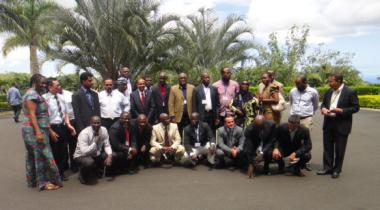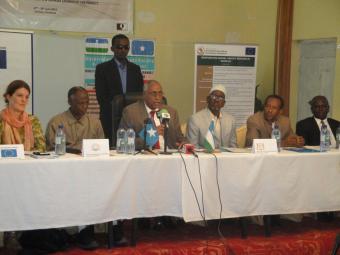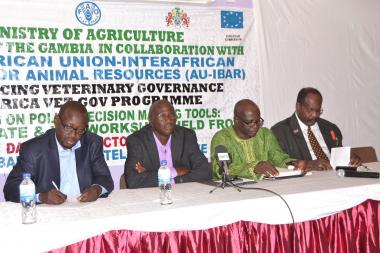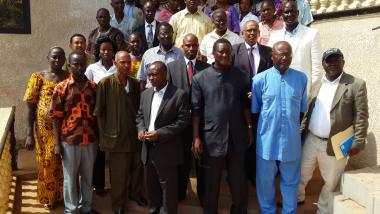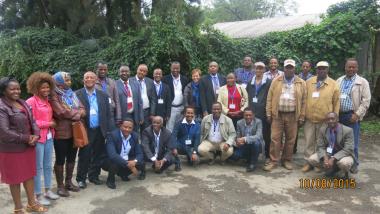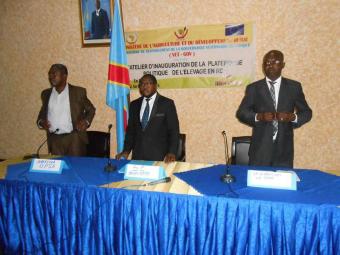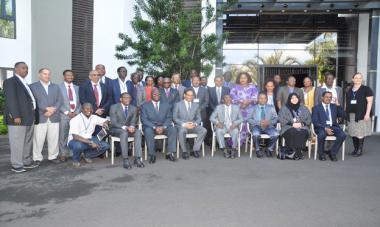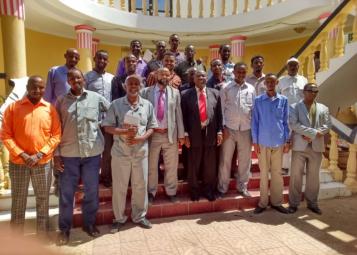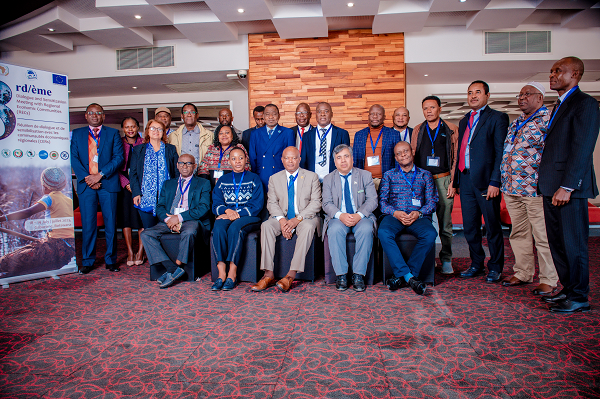
A dialogue meeting that took place in Gaborone, Botswana, from 18th to 19th July 2023, involved the African Union InterAfrican Bureau for Animal Resources (AU-IBAR), the AUDA-NEPAD Planning and Coordinating Agency (NPCA), and the Regional Economic Communities. The meeting, held under the FishGov 2 Project was supported by the European Union, and attended by a total of twenty-five participants. These participants included staff members from AU-IBAR, the European Union representative Mr. Eulade Mboneye, and representatives from eight Regional Economic Communities (RECs): CEN-SAD, ECOWAS, IGAD, UMA, EAC, COMESA, ECCAS, and SADC. Additionally, present at the event was Panduleni Ndinelago Elago, Senior CAADP Advisor, representing the African Union Commission.
In his address at the commencement of the meeting, Dr. Nick Nwankpa, the Acting Director of AU-IBAR, conveyed his gratitude for the notable presence of all the Regional Economic Communities (RECs) in attendance. He noted that this collective participation serves as a tangible manifestation of their dedication and enthusiasm towards the advancement of the African Union's development agenda. Dr. Nwankpa additionally emphasised to the delegates that the FishGov2 project is currently in the midst of its implementation phase. He further observed that the meeting serves as an opportune moment to provide an update on the advancements made in the technical implementation of the project, as well as the progress made in implementing the recommendations derived from previous technical coordination and steering committee meetings. Read full speech.
According to Dr. Domingos Dove, the Director of Food, Agriculture, and Natural Resources, who represented the SADC Executive Secretary, it is evident that our fisheries resources are facing significant challenges. These challenges include the detrimental effects of overfishing, the presence of illegal, unreported, and unregulated (IUU) fishing activities, pollution, the impact of climate change, and the degradation of habitats. The delegates were provided with instructions to implement specific measures in order to guarantee the sustainable management of our fisheries and aquaculture resources. The aforementioned items comprised:
• Prioritizing the promotion and enforcement of policies and regulations that are aligned with international standards and best practices.
• Investing in capacity building, research, and development in order to make informed and evidence-based decisions.
• Embracing the potential of the blue economy as well as freshwater resources as these offer immense opportunities for economic growth, innovation, and job creation, and
• Enhancing regional cooperation and collaboration, as it is only through collective action that we can effectively address cross-border challenges such as illegal fishing and pollution.
The meeting was officially opened by Mr. MD Ghulam Kibria, Deputy Permanent Secretary-Aquaculture and Inland Fisheries, representing the Ministry of Agriculture, The Republic of the Government of Botswana. Mr. Kibria emphasised to the delegates the significant role that the fisheries sector plays in enhancing food and nutrition security, as well as improving the livelihoods of numerous African nations, particularly rural communities. The author further emphasised the importance of acknowledging that the global population is projected to reach approximately 10 billion by the year 2050. Consequently, this will significantly amplify the demand for animal protein, creating a substantial gap. As a result, aquaculture emerges as the most feasible sector to address this disparity. Mr. Kibria noted that while there is exponential growth in aquaculture production, the capture fisheries sector is encountering numerous challenges resulting in a decline in production. Consequently, there is a necessity to advocate for the adoption of sustainable use practices. Read full speech.
The RECs also shared their current activities so as to find ways of generating synergies with RECs in the implementation of the FishGov 2 Project. In addition, FAO presented on their existing activities relating to fisheries governance. The meeting ended with several recommendations that would be channeled to the European Union for consideration during the mid-term review of the Project. Mr. Eulade, who was attending the FishGov meeting for the last time due to a transfer, in closing extended his thanks to SADC as the hosts of this year’s dialogue, and for AU-IBAR for making the event timely. He informed the meeting that the recommendations needed to be implemented in earliest possible time and thanked the whole team for implementing the FishGov 2 Project in the past 2 years.
The RECs play a pivotal role as an interface between continental initiatives and the AU member states. The three leading implementers of the Fisheries Governance 2 Project met for their annual dialogue on emerging issues of Fisheries Governance as agreed at the first dialogue that was held in Naivasha, Kenya from 28th November, 2021 to 1st December, 2021. The RECs delivered presentations that touched on the background information of their establishment, statistics, and role of fisheries and aquaculture in the regions, guiding sectoral, regional policy and regulations, fisheries and aquaculture projects and activities in their regions.

